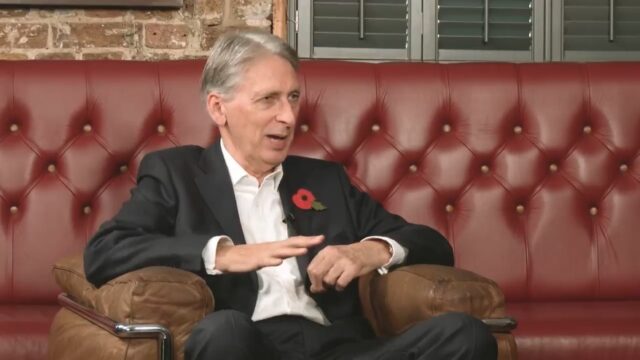PHILIP Hammond believes Jeremy Hunt will announce fresh windfall taxes on energy firms in his upcoming Autumn Statement.
Speaking exclusively to GB News, Mr Hammond said he would be “surprised” if the Chancellor didn’t “move further” on the issue.
His prediction was one of a number of revelations in a wide-ranging interview with GB News’ Gloria De Piero that will be screened tomorrow [Thursday].
Mr Hammond also:
Admitted to being left “mildly astonished” as he listened to Kwasi Kwarteng’s now infamous mini-budget.
Predicted that benefits would rise in line with inflation, but this shouldn’t always be a guiding principle for the future.
Said he felt the pension triple lock was likely to stay in place this week, but that it needs to be looked at again.
Never really thought Liz Truss displayed “leadership qualities”, when she served as his deputy at the Treasury.
Believed his ex-Cabinet colleague Matt Hancock had now effectively ended his political career – by agreeing to appear on I’m A Celeb.
Explaining why he felt the Chancellor would move on windfall taxes, Mr Hammond told GB News: “As it happens, I am broadly in favour of a windfall tax. As long as it’s sensibly structured, and only tackles the genuinely windfall element, not the cyclical ups and downs that you get in energy markets, because energy companies plan around those cycles.
“But where genuine windfalls are earned, I think it is legitimate to tax them. And, actually, I’d be quite surprised if Jeremy Hunt doesn’t move further on some kind of a windfall tax, when he announces his Autumn Statement. Wealth taxes, more taxes on rich people, of course, are always very tempting for people who think that this is a way of avoiding the dilemma. But there just aren’t enough rich people who are captive here in the UK, this is the thing to remember. As our population gets older, we will have to pay more taxes, all of us, not just the rich. That’s an arithmetical fact, it’s not a political judgement.”
Commenting on what he believes will happen with benefits and the pension triple lock, Mr Hammond continued: “I expect that Jeremy Hunt’s judgement in this statement will be that we have to go ahead with both maintaining the triple lock, and upgrading in line with inflation because of the huge pressure that people on low incomes are under from rising prices and high inflation.
“But I do think in the longer run, there are two issues. One is around pensions. Is it really right that we should always up the rate by the highest of wages / prices or by 2%?
“I think that is quite difficult to justify, and not all pensioners are poor. So I think there is a case for looking again at the way we treat pensioners, and possibly for distinguishing the poorest pensioners from the great body of pensioners, some of whom are really quite comfortably off. And on benefits generally I think the challenge is that in a period when the pressure is on to keep inflation down, it means holding wages down, often to a level of increase below the rate of inflation. You do have to ask yourself, whether it is really fair, and whether it’s sustainable in the long run, to see benefits for people not in work rising in line with inflation. I think that does raise an issue about fairness.”
Reflecting on how he felt listening to Kwasi Kwarteng’s mini-budget, Mr Hammond said: “Mildly astonished I think is probably the right expression. Look, Liz Truss never made any secret of the fact that she believed as a sort of piece of political theory, that slashing taxes would automatically lead to significant increases in growth, and that this would be a way to reinvigorate the economy. Most economists don’t agree with that. There are points where reducing taxes does have that effect. When the UK income tax rate was cut from 83% to 60% it had a galvanising effect across the economy as you’d expect.
“But cutting the top rate from 45 to 40, was never going to deliver enough additional revenue to make good the political damage, and the broader loss of confidence that was created in the markets. So, I think we all knew, as soon as we heard how the mini budget had been framed, that it was going to unravel, and it was going to do more damage than it did good. So Jeremy Hunt will be keen to avoid making those mistakes.”
On how the mini budget had now impacted things moving forward, Mr Hammond said: “Liz Truss had a plan for borrowing to fund tax cuts, the markets have now effectively told the British government, whoever’s running it, enough with the borrowing, you’ve now got to balance the books. And that means as the population gets older that we either have to pay more taxes, or we have to cut our public services and shape them differently or fund them differently. So if you want to maintain the same level of public services, there will have to be more tax revenue raised.”
When he was Chancellor, Liz Truss served as Chief Secretary to the Treasury under Mr Hammond. He said that during those years working together, he didn’t see her as a natural leader.
“No, I didn’t think that,” he said candidly. “I think it is very, very difficult to spot that magic quality. I mean, obviously, there are exceptions to that rule. And although I’m well known not to be a great Boris fan, no one could have doubted that there was a serious chance that Boris would end up as leader of the party. I think the same was true of Tony Blair. In his time, it was just obvious that he was a person that was likely to make it to the top. But no, I think, generally, it is quite difficult to see. And sometimes people’s qualities as a leader only come through during the campaign.”
Reflecting on Boris Johnson’s decision to withdraw the whip from him after he became Tory leader, Mr Hammond said: “Well, to be honest, first of all, it felt like a bad joke. And we all assumed it was a sort of petulant tantrum. But then it became clear he was actually serious that he was going to try to purge the Tory party of people who didn’t agree with him on this particular issue (of Brexit). And that was never going to work. The Tory Party has been a very successful political party over many, many, many decades. And it’s done it by being incredibly flexible, and agile on policy. Some might say policy light, but it’s also done it by being a very broad church. And during my time in the Conservative Party, I’ve worked with people with pretty solidly right wing views and people with views that would have been perfectly acceptable on the right of the Labour Party. And that’s the strength that always has been the strength of the Conservative Party. As soon as you start chucking people overboard, and trying to make it narrow, you’re going to run into trouble pretty soon. And I think Boris Johnson and Liz Truss have proved that. Hopefully, Rishi Sunak is now back on the track of trying to make his Cabinet more inclusive, and we will get back to that sense of the Tory party as a broad church.”
But one person who Mr Hammond doesn’t expect to be part of that “broad Church” is Matt Hancock, who is now starring in I’m A Celeb. When asked if he’d be tuning in, Mr Hammond said: “No, I have watched I’m A Celebrity in the past. So I know what it’s about. I am not a fan. And I will not be tuning in to watch Matt Hancock, I think I’ve seen probably quite enough of Matt Hancock to last me a lifetime. Should he be there? Well, that’s his decision I think. Probably he’s sending a pretty clear signal that he’s decided to move on from politics.”
Mr Hammond also reflected on his period as Chancellor and addressed the biggest challenges he faced.
He told GB News: “The hardest thing is reminding people that if the books don’t balance, all the other good things you want to do, all the projects you want to finance, all the public services you want to maintain, just can’t be sustained.
“And that’s not always a message people want to hear. But fiscal discipline is at the heart of being able to run high quality public services, and having high private standards of living. My experience was a little bit different, because of course, between 2016 and 2019, the entire period was totally dominated by the question of how to interpret the Brexit vote. It was about how to manage the process of trying to turn this potentially very damaging decision to leave the European Union, into something which could be the basis for future success rather than future failure. And it was about how to find a way of allowing Britain to go on earning its living so that we could continue to have high standards of living, high quality public services and relatively low taxes.”
On his own ambitions to ever become Prime Minister he added: “No, I didn’t want to be. I think one of the key things in life is to know your strengths, and to know your weaknesses as well and to work out where you’re likely to be successful and where you’re likely to be less successful. And I was very happy to be Chancellor, a job that I’d always wanted to do. I would not have succeeded in the weekly combat that is Prime Minister’s Questions. I think I could have done other aspects of the job perfectly well. Parliamentary performance was never my strong point. So I think you’ve got to know your weaknesses, know your strengths. And the point of a team is that you’ve got people with different strengths and working together.”




